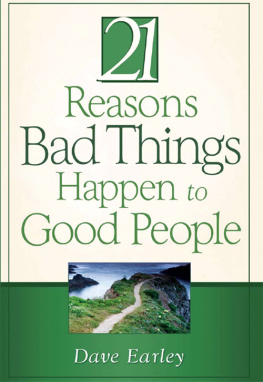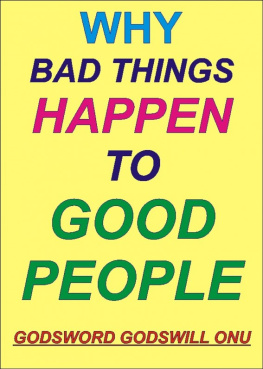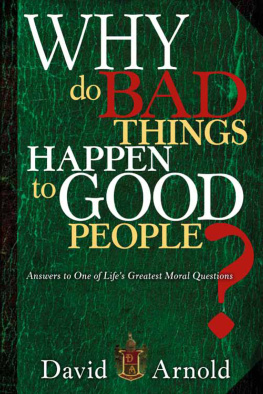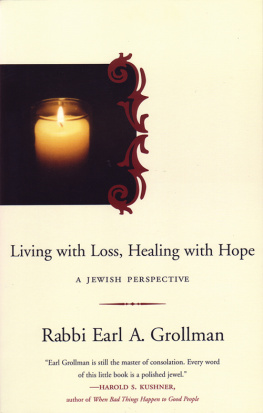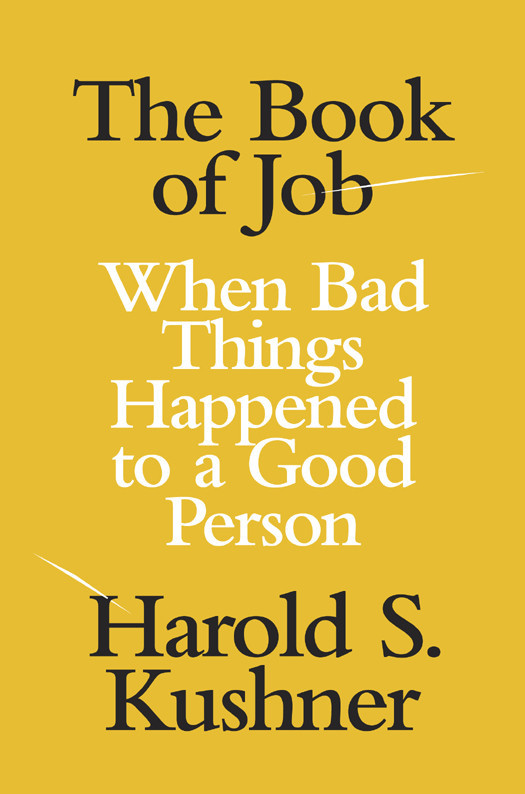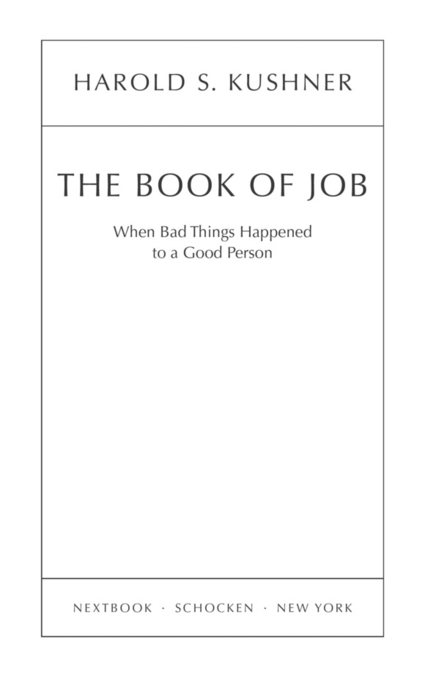Copyright 2012 by Harold S. Kushner
All rights reserved. Published in the United States by Schocken Books, a division of Random House, Inc., New York, and in Canada by Random House of Canada Limited, Toronto.
Schocken Books and colophon are registered trademarks of Random House, Inc.
Grateful acknowledgment is made to the following for permission to reprint previously published material:
HarperCollins Publishers and Michael Katz: Excerpts from The Summation from The Book of Job, translated by Stephen Mitchell. Copyright 1979 by Stephen Mitchell. Revised edition copyright 1987 by Stephen Mitchell. Reprinted by permission of HarperCollins Publishers and Michael Katz on behalf of Stephen Mitchell.
The Jewish Publication Society: Excerpt from The Book of Job appearing in Tanakh: The Holy Scriptures. Copyright 1985 by The Jewish Publication Society. Reprinted by permission of The Jewish Publication Society.
Library of Congress Cataloging-in-Publication Data
Kushner, Harold S.
The book of Job : when bad things happened to a good person / Harold S. Kushner.
p. cm.
eISBN: 978-0-8052-4307-9
1. Bible. O.T. JobCommentaries. 2. SufferingReligious aspectsJudaism. I. Title.
BS 1415.53.K87 2012 223.106dc23 2011051531
www.schocken.com
Jacket design by Joey Cofone
v3.1
IN LOVING MEMORY OF
Aaron Zev Kushner
(19631977)
AGAIN AND ALWAYS
AND IN MEMORY OF
Professor H. L. Ginsberg
(19031990)
CONTENTS

Dedication
INTRODUCTION

T his book represents the closing of a circle. Many years ago, in 1964, I was a young assistant rabbi at a suburban Long Island synagogue and the father of a one-year-old son. I was also pursuing an advanced degree at the Jewish Theological Seminary. I had just passed my oral exams for a doctorate in Bible and met with my adviser, Professor H. L. Ginsberg, chairman of the Bible department, to choose a dissertation topic. He asked me if I had a topic in mind. I told him that I would like to write about the role of God in human tragedy as portrayed in the Bible. As a teenager, I had been shaken when the facts of the Holocaust came to light. Already in my brief career as a rabbi, I had officiated at the funeral of a seventeen-year-old boy who died in a freak accident, I had visited seriously ill congregants in the hospital, I had paid condolence calls on husbands and wives grieving for a life partner taken from them all too soon, and I had felt inadequate when I tried to explain to families why such things happened in Gods world. Professor Ginsberg smiled and said, Youre not ready to write that. I ended up writing on the chronology of the biblical psalms.
Over the course of the next dozen or so years, events brought me closer to the issue of lifes unfairness and Gods role in dealing with it. My wife and I learned that our young son suffered from one of the worlds rarest diseases, progeria, the rapid aging syndrome. He stopped growing and started growing old at age three, and died the day after his fourteenth birthday.
When Aaron was diagnosed with progeria, I read everything I could find about his condition (there was very little available at the time) and everything I could find about Gods role in the suffering of innocent children. It was from Dimensions of Job, a book edited by Nahum Glatzer and published by Schocken Books, that I drew the ideas that would become the core of my belief system.
After Aaron died, it took two years for me to gain the perspective needed to think about his death in terms of what it meant rather than how much it hurt. I then sat down to write a book about the kind of God I could have faith in and to whom I could turn in a world where good people suffer and die. I called it When Bad Things Happen to Good People. It was turned down by two publishers, at which point I took it to Schocken. They liked it, published it, and promoted it. It went on to become a major best seller and a source of comfort to millions.
I would write nine more books to share with my readers the ways in which religion could help them in difficult times. Then two years ago, I was approached by Nextbook, which has been putting out an impressive series of biographies and other books for their Jewish Encounters series in collaboration with Schocken. They asked me to write a book about the biblical book of Job and the question of why good people suffer, a book in which to share the wisdom of the book of Job and its enigmatic answer. This book, then, represents my return to that years-ago conversation with Professor Ginsberg and my return to my first publisher, Schocken Books. It represents my adding my name to the distinguished list of Nextbook authors in their Jewish Encounters series. And it returns me to the issue that I believe I was put on earth to deal with, the question of what kind of world we live in. Is it a world designed to sustain and reward goodness, a world in which God is clearly on the side of the virtuous? Or is it a morally blind world, a morally neutral world in which events happen because they happen, with no deeper meaning? The rain falls equally on the fields of honest and dishonest farmers; malignant tumors afflict charitable and selfish people without distinction. Or is there perhaps a third dimension to our search for meaning, beyond the question of Why did this happen to me?
Somewhere, I would like to think, Professor Ginsberg is smiling.
1

Does Everything Happen for a Reason?
L ike many suburban homeowners, my wife and I maintain a bird feeder in our backyard, visible from our kitchen window. We enjoy the songs and the liveliness of the birds, and we feel good about feeding them. But from time to time, for one reason or anothervacations, illness, four inches of snow on the groundwe neglect to refill the feeder. At times like that, I will notice a bird or two come to the feeder looking for food, find none, and fly away. And at times like that, because I am a theologian, I find myself wondering, Do birds wonder why sometimes there is food in the feeder and sometimes the feeder is empty? Do they look for patterns, perhaps making a connection between snow on the ground and an empty feeder? Given that we often make a point of refilling the bird feeder for the Sabbath when we will be at home to enjoy it, do they develop an awareness that every seventh day there will be food for them? Do they ever wonder if something they did was responsible for food being withheld from them?
I cant know for sure, but I suspect that none of the above is true. I suspect that birds come to our backyard, where they have found food before, and if they dont find it, they fly off to look elsewhere. That is one of the differences between human beings and other living creatures. Human beings are meaning-makers, constantly trying to understand our world in terms of cause and effect. We desperately want to believe that the world makes sense, that it is a place where things dont just happen, they happen for a reason. Painful as it may be to conjure with, we want to be told that it was not by accident that a family member got cancer or an earthquake struck a given city, that there was a purpose to it. An unpredictable world, a world of randomness unregulated by cause and effect, would leave us uncomfortable.


